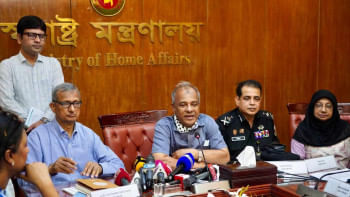Smart governance
THE current government has come to power with the catchphrase of "Digital Bangladesh." However, to be frank, common people are not that conversant with this term. Public services will not reach the doorsteps of the ones who need them most unless they are made easily accessible and obtainable. Increased use of ICT can greatly facilitate government initiatives to make the administration citizen-friendly.
Smart (simple, moral, accountable, responsive, transparent) Governance, a comprehensive yet effective term denoting good governance, thus, might be a real guide to both the government and the citizens in this regard. It can be used as a yardstick as well for measuring performance.
Meanwhile, a bird's eye view of our administrative machinery is good enough to provide us with the real scenario as to where our governance stands with regard to Smart Governance.
Let us start with simplicity. Are governmental functions simple enough in Bangladesh? Even the language of various governmental forms is too complex. This is even more glaring in legal matters. Interpretation of rules and regulations, thus, becomes matters of manipulation by the authorities, which prove to be problematic for the common people.
In England, steps have taken to make the official and legal language as simple as possible. However, in Bangladesh, procedural complexities, too, have to be done away with to make the administrative machinery truly simple.
If sufficient amount of morality is not infused into the public servants, they are unlikely to serve people with honesty and dedication, no matter whether they are qualified or not. For that very reason, many developed states in the world have initiated training on ethical standards for their public servants.
Due emphasis on morality along with quality is also being advocated by the authorities on civil service ethics. In Bangladesh, however, the salary structure of the public servants has to be bettered because good moral standard cannot be expected from half-fed public employees.
Accountability is the cornerstone of good governance. No system will work well unless the accountability mechanisms are functional and efficacious. This is true in our perspective, where there is still a very weak accountability framework. Our parliamentary committees have not yet been able to make their presence felt.
Though a tax ombudsman was appointed couple of years ago, its activities are little known. Meanwhile, our political governments have not yet been able to materialise the provision of a national ombudsman though such a provision has been in the Constitution since its inception.
Reform efforts throughout the world have increased "responsiveness towards the citizenry." Mechanisms in the form of citizens' charters and public feedback surveys have been in vogue in many states to enhance citizens' choices and encourage their contribution to public service delivery.
The Public Administration Reforms Commission recommended introducing citizens' charters in 2000, and the non-party Fakhruddin-led government put that into practice in 2008. Consequently, many government agencies published their charters. However, mere introduction will serve no purpose unless application of the charters is duly monitored.
Meanwhile, transparency holds the key to keeping the people updated about what the government is doing in policy matters. Since independence, our political governments did not even look into the issue of citizens' right to information.
Under the garb of so-called confidentiality, people are regularly deprived of their civic rights. Whatever information they are provided is also inadequate, which bring delays in official dealings and paves the way for kickbacks. Even in this case, the non-party Fakhruddin-led government presented the nation with a "Right to Information" Act, which the current government decided to ratify, though reluctantly.
Our governments have a tendency to keep the people in the dark, not only on internal issues but also on crucial external matters such as contracts with the foreign governments and agencies. Some such contracts have, however, been exposed to be detrimental to national interests.
The current debates on transit and Tifa also call for absolute transparency on the part of the government. It is the bounden duty of the government to let the people of all walks of life know what agreements it wants to reach with various internal or external parties.
Smart Governance is neither high-flown jargon nor rhetoric. It is the combination of the basic requirements of a good, or good enough, governing system. Though the start of the current government has attracted mixed reactions, it will be well advised to channel its efforts towards providing the nation with simple, moral, accountable, responsive and transparent governance so that the people can have the taste of its "Digital Bangladesh" motto. If the public is not served better, all technological advancements will remain useless at the end of the day.

 For all latest news, follow The Daily Star's Google News channel.
For all latest news, follow The Daily Star's Google News channel. 



Comments